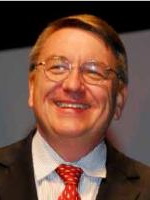
Dr. Paul Alan Cox is an ethnobotanist whose scientific research focuses on the ecology of island plants and the uses of plants by island peoples. After receiving his BS in botany from Brigham Young University, he was awarded a Fulbright Fellowship to read for his MS in ecology at the University of Wales at Bangor. He received a Danforth Fellowship and a National Science Foundation Graduate Fellowship for his PhD studies at Harvard University in biology. He subsequently was awarded a Miller Research Fellowship at the Miller Institute for Basic Research in Science at the University of California, Berkeley and later became a University of Melbourne Research Fellow in Australia. Although trained in evolutionary ecology, Cox became increasingly focused on ethnomedicine after his mother died from breast cancer.
He served for years as professor and dean at Brigham Young University and later became the first King Carl XVI Gustaf Professor of Environmental Science at the Swedish Agricultural University and the University of Uppsala, a visiting professorship established by the Royal Academy of Sciences, for an academic year. For seven years he was Director of the Congressionally Chartered National Tropical Botanical Garden in Hawaii and Florida and is currently Executive Director of the Institute for Ethnomedicine in Jackson Hole, Wyoming. He is the author of over 180 scientific papers and reviews, and was chosen by TIME as one of eleven “Heroes of Medicine” for his search for new medicines from plants. In 1997 he received the Goldman Environmental Prize for the conservation efforts described in his book Nafanua: Saving the Samoan Rainforest, which has been translated into German, Japanese, and Samoan. He speaks a variety of island languages and is internationally renowned for his advocacy of indigenous peoples. He served an LDS mission in Samoa.
- 917 views